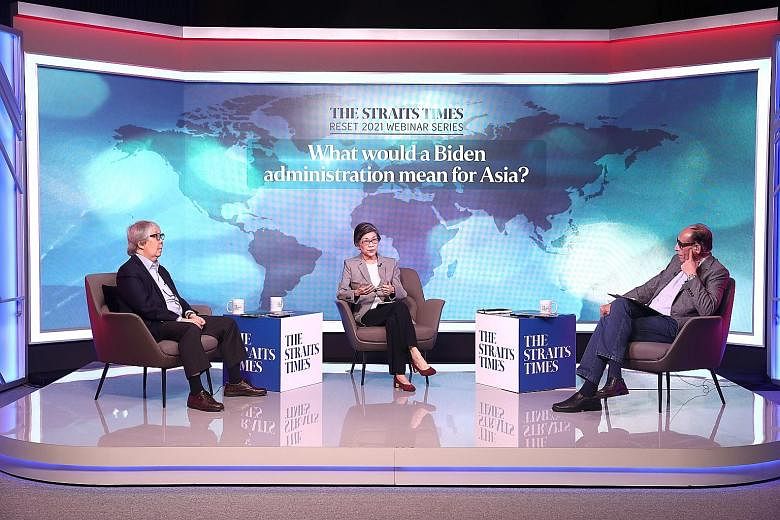It is a very different Asia that US President-elect Joe Biden will face when he assumes office, and the incoming leader of the world superpower must be prepared to consult the region and listen to its views.
This was the message that veteran diplomat and former Singapore ambassador to the United States Chan Heng Chee had for Mr Biden and his administration, which she shared at The Straits Times' inaugural Geopolitical Reset 2021 webinar on Thursday. Panellists on the forum included veteran diplomat Tommy Koh, also a former Singapore ambassador to the US.
The two diplomatic heavyweights - both ambassadors-at-large with Singapore's Foreign Ministry but speaking in their personal capacity - discussed how the US under Mr Biden is likely to manage its relationships in Asia in areas including trade, technology and political ideologies. They were joined by ST's US bureau chief Nirmal Ghosh, global affairs correspondent Benjamin Kang Lim in Beijing, and associate editor Vikram Khanna.
"I want to tell President Biden… In the last four years, Asia has changed," Prof Chan said, adding that Asian nations had since developed a greater sense of agency. "(Countries in Asia) have taken a lot of initiatives in the absence of American leadership. And they (Mr Biden's team) should bear that in mind. So they should come to the region, but should consult and listen."
Prof Koh urged Mr Biden's team to prioritise pragmatism over ideology in their policies towards Asia, lest they be doomed to failure.
"Every American administration… must uphold the values of democracy and human rights. But I hope that in your formulation and execution of policy towards Asia, you will allow realism, pragmatism and wisdom to prevail over ideology," he said. "Any attempt by the Biden administration to divide Asia and to form an anti-China coalition will fail, and it will not be welcome."
A RETURN TO STABILITY
Both ambassadors agreed that the Biden administration will be an improvement for US-Asia ties, ushering in a period of greater predictability, stability, professionalism and structure for the region than it has been under Mr Trump.
America under Mr Biden is set to re-embrace multilateralism and look towards strengthening alliances, they said, with the President-elect pledging to rejoin the World Health Organisation and the Paris climate accord, both of which Mr Trump has abandoned.
Mr Biden or his Vice-President-elect Kamala Harris might attend the next Asean summit, elevating the importance of the regional body and South-east Asia to US policy, as former president Barack Obama did, Prof Koh said.
But with regard to US-China ties - America's defining relationship in Asia - Mr Biden would find it very difficult to reverse the downward course, given extremely negative opinions about China in the US public and political spheres.
"My own prediction is that Biden will end Trump's 'cold war' against China, but he will not be able to bring the relationship back to what it was during the Obama administration," Prof Koh said. "The 'cold war' will be replaced by a 'cold peace'... in which the two countries don't see each other as enemies... but there's no warmth in the relationship, because there's a deficit of strategic trust."
Mr Ghosh agreed: "Biden's advisers... are talking about competition without catastrophe... There is a feeling that the US-China competition has gotten out of hand."
The Trump-imposed import tariffs on China will probably come into greater focus in the second half of next year, but lifting them may require "targeted reciprocity" from China, Prof Chan said.
COMPETE ON CAPABILITY
Mr Lim Kang opined that if Mr Biden halts Washington's attempts to decouple the US and China economies, Beijing might also modify its stance on its own "dual circulation" policy - a strategic, defensive move towards self-sufficiency in trade and technology in response to US aggression.
He said Beijing wants an end to the Sino-US "tech war", in which Mr Trump has imposed sanctions to disrupt Chinese technological advancement, purportedly over national security concerns.
The best way for America to compete with China for global tech supremacy is to strengthen its own research capability, Prof Chan said, adding that Mr Biden himself had previously made this point. "The United States has not funded R&D (research and development) in the way it used to... You (should aim to) beat China because your technology is superior... I think that is the way to go," said Prof Chan.
On global trade, Prof Koh said withdrawing from the Trans-Pacific Partnership (TPP) - a proposed trade pact among 12 countries on both sides of the Pacific, excluding China - was one of Mr Trump's biggest blunders.
After the US withdrawal, the pact was revised to become the 11-nation Comprehensive and Progressive Agreement for Trans-Pacific Partnership (CPTPP) now in effect, but the US is unlikely to rejoin it even under Mr Biden, he said.
"American politicians have succeeded in demonising free trade and the TPP, so much so that... the political cost for Joe Biden to join CPTPP is too high and it would not get through Congress," Prof Koh said. "The American leadership... should wake up. Do you want to be alone in the world, or do you want to be... leading the world?"
SOME TENSIONS WILL REMAIN
Although a Biden presidency may ease severely strained Sino-US ties, some areas of tension have already become a reality unlikely to be reversed, such as the US' freedom of navigation operations in the South China Sea, according to Prof Chan.
Those operations in the region - which involve the US Navy sailing through to reinforce internationally recognised freedoms despite countries' competing claims - are now routine exercises, she said.
"When Trump took a strong stance on the South China Sea… regional countries also took a stronger stance (against Beijing's claims there)," Prof Chan said, adding that Mr Biden's team is likely to continue its vigilance in the waters.
The issues of Taiwan and Hong Kong, too, will persist, given strong bipartisan support in the US to ensure freedoms in both economies are protected.
DON'T PEDDLE 'DEMOCRACY'
America's resolve to shield Taiwan from perceived threats from Beijing would be even stronger under a Democratic president given the party's core beliefs in upholding democracy, Prof Koh said.
But he warned against Mr Biden's professed intention to host a global democracy summit, given differing interpretations of what democracy means and how such a forum might risk ostracising US allies like communist Vietnam.
"You can, without using the word 'democracy', champion good governance or rule of law or inclusive growth... instead of choosing a theme where you exclude half your friends," Prof Koh said.
Prof Chan had this advice for a Biden presidency looking to uphold democracy abroad: "America can show that it stands for democracy, good governance and human rights in other ways. Call out the actions when you see (that they) are wrong, which was something the Trump administration did not do in the last four years."


